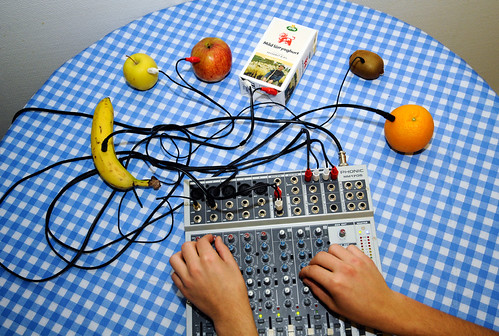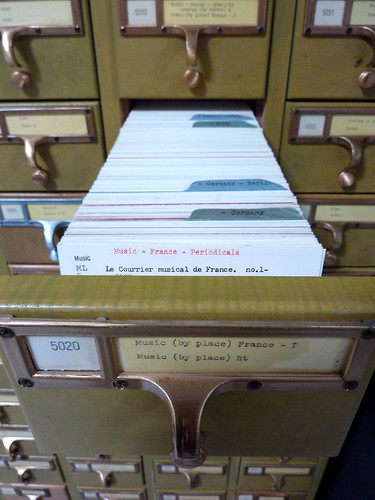
KITCHEN MIXER shared CC by Viktor Hertz
Audio archive of #ds106 remote session is here:
[audio:https://abject.ca/wp-content/uploads/2011/03/Archive of Live Session.mp3]See also the latest DS106 Remix course page.
An analog prologue: a world before Photoshop, before the web…

Library card catalog shared CC by John Kannenberg
Back then [cue nostalgic music], if someone needed to assemble a list of references to research a given topic, at least part of the process worked something like this…
The act of purposefully identifying, capturing, reworking, and republishing media could be mind-bendingly time-consuming, and “professional” effects nearly impossible to accomplish.
Looking back from 2011, it’s almost embarrassing to recall how powerful the ability to “jam the culture” seemed to some of us in the early 90’s…
WE will take on the archetypal mind polluters
– Marlboro, Budweiser, Benetton, McDonald’s, Coke, Calvin Klein, Whittle –
and beat them at their own game.
WE will uncool their billion-dollar images
with uncommercials on TV, subvertisements in magazines
and anti-ads right next to theirs in the urban landscape.
WE will take control of the role that the tobacco, alcohol,
fashion, cosmetics and fast food corporations play in our lives.
We will hold their marketing strategies up to public scrutiny and set
new agendas in their industries.
We will culture jam the pop culture marketeers
— MTV, Time-Warner, Sony —
and bring their image factories to a sudden, shuddering
halt.
ON the rubble of the old media culture, we will build a new one
with a non-commercial heart and soul.
— Adbusters Media Foundation — (1993)
Sonic Outlaws (1994) by Craig Baldwin. It’s hard to overstate how inspiring and influential this film was to me.
This segment from Negativland talking about their approach to appropriation sounds both prescient and somehow naive.
Being Digital
Combine that urgency with the counterculture roots of early internet culture in that period. The Whole Earth Catalog and The WELL (Whole Earth ‘Lectronic Link) were started by many of the same people (Stewart Brand, the best known).
Audio of Terence McKenna on how digital networks dematerialize culture: Computers and Boundary Dissolution
Interview: Vicki Bennett: People Like Us
DrivingFlyingRisingFalling from Vicki WFMU on Vimeo.
“Since 1991 Vicki Bennett has been making CDs, radio, and A/V multimedia under the name People Like Us. Ever since she has been animating and recontextualising found footage collages with an equally witty and dark view of popular culture with a surrealistic edge, both pre-recorded and in a live setting.”
Vicki Bennett On the impact of Broadband (2 mins)
Vicki Bennett On the Future of Mashed Media (3 mins)
Scene from Decoder with Genesis P-Orridge
See also: Codpaste (with Ergo Phizmiz) – 14 one hour podcasts on the thematic elements and process that go into this kind of work. Includes a PDF (30MB) teaching pack.
Modern Remix Culture:
Interview: Mara Balestrini
Teaches film-making by and for mobile devices
Doing cool stuff with Pirate Boxes.
Interview with Mara on Neuroscience of Remix (4:00)
Full interview with Mara Balestrini (17:41)
Interview: Julio Alonso (street art blog, cabeza ueca) and Gino Cingolani: “we are a media generation”
El Seminario ¿El Paréntesis de Gutenberg? La conversión digital como proceso civilizatorio.
Video to close GP seminar – Paréntesis de Gutenberg vs Daft Punk – Technologic
Paréntesis de Gutenberg Vs Daft Punk . Technologic from JuLiTo Alonso on Vimeo.
Suecada Scott Pilgrim vs The World
How media shapes how Gino and Julio work and play (2:06)
Full interview with Gino Cingolani and Julio Alonso (34 mins)
Links that are referred to in this conversation: http://www.youtube.com/user/CorridorDigital, http://www.raphkoster.com/, http://www.youtube.com/user/AxxMarquez
Interview: Tony Hirst on data telling stories

Image via IBM History Flow visualization of entry for “Islam” on Wikipedia
Tony’s suggested links for #ds106
Tony’s blog posts tagged with “digital storytelling”
Tony’s courseblog, Visual Gadgets
Data tells stories, 1 (3:46)
Data tells stories, 2 (1:41)
Tony’s assignment ideas (4:00)
Also discussed: Using Gephi to visualise your Facebook network, Visualising F1 Telemetry data, Visualising code check-ins – animations, How to create a time-lapse video of a Wikipedia page (or any website)
Full interview with Tony Hirst (30 mins)
See also, Ewan McIntosh, Data Reveals Stories, Part Two: Words, Part Three: Boxes, Part Four: Images, Part Five: Maps, Part Six: Graphs: Since 2010 we’ve never had so much publicly available data about the way our lives are run, the environment, our geography, our history… But most of us don’t know how to tap into the PDFs, tables, geocodes and charts to dig out the meaningful stories hidden in there. Learning how is one of the key new literacy skills our youngsters will need if they are to be fully participative members of society.
See also The Wilderness Downtown – example of open data ‘customizing’ an aesthetic experience
Is “mashup” still a valid concept?
Bruce Sterling: Bruce Sterling on Mashups
Is “valid” even a useful question to ask in terms of media form?
See also:
Free Music Archive Remix Contest – examples



9 thoughts on “Let Us Never Speak Of This Thing Again”